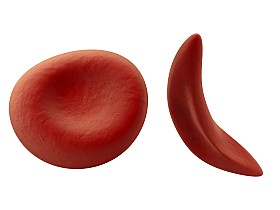 A multicenter randomized trial suggests that preoperative transfusion is associated with decreased perioperative complications among patients with sickle cell disease (hemoglobin SS or Sβ0thalassaemia). The Transfusion Alternatives Preoperatively in Sickle Cell Disease (TAPS) study evaluated 67 patients scheduled to undergo either low-risk (19%) or medium-risk (81%) surgery. Among these patients, 34 were assigned to receive preoperative transfusion within 10 days of the surgery, while the other 33 were not transfused preoperatively. Patients who were not transfused preoperatively were at a significantly higher risk of complications than those who had been transfused (Odds Ratio: 3.8, 95% CI 1.2 -12.2, p = 0.027). Ten patients who had not been transfused preoperatively experienced severe adverse events, while only one patient who had received preoperative transfusion experienced these effects. The most common severe adverse event was acute chest syndrome. Increased incidence of complications among patients who had not been transfused preoperatively resulted in an increased need for intraoperative or postoperative transfusion. In addition, quality-of-life scores were higher in the preoperative transfusion group than among patients who had not been transfused. Researchers also found that the overall cost of resources was lower for the preoperative transfusion group by UK£440.
A multicenter randomized trial suggests that preoperative transfusion is associated with decreased perioperative complications among patients with sickle cell disease (hemoglobin SS or Sβ0thalassaemia). The Transfusion Alternatives Preoperatively in Sickle Cell Disease (TAPS) study evaluated 67 patients scheduled to undergo either low-risk (19%) or medium-risk (81%) surgery. Among these patients, 34 were assigned to receive preoperative transfusion within 10 days of the surgery, while the other 33 were not transfused preoperatively. Patients who were not transfused preoperatively were at a significantly higher risk of complications than those who had been transfused (Odds Ratio: 3.8, 95% CI 1.2 -12.2, p = 0.027). Ten patients who had not been transfused preoperatively experienced severe adverse events, while only one patient who had received preoperative transfusion experienced these effects. The most common severe adverse event was acute chest syndrome. Increased incidence of complications among patients who had not been transfused preoperatively resulted in an increased need for intraoperative or postoperative transfusion. In addition, quality-of-life scores were higher in the preoperative transfusion group than among patients who had not been transfused. Researchers also found that the overall cost of resources was lower for the preoperative transfusion group by UK£440.
Reference
1. Howard J, Malfroy M, Llewelyn C, Choo L, Hodge R, Johnson T, Purohit S, Rees DC, Tillyer L, Walker I, Fijnvandraat K, Kirby-Allen M, Spackman E, Davies SC and Williamson LM. The Transfusion Alternatives Preoperatively in Sickle Cell Disease (TAPS) study: a randomised, controlled, multicentre clinical trial. Lancet. 2013; 61726-7. [Epub ahead of print]
